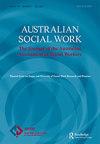Barriers Preventing Indigenous Women with Violence-related Head Injuries from Accessing Services in Australia
IF 2
3区 社会学
Q2 SOCIAL WORK
引用次数: 1
Abstract
ABSTRACT Traumatic brain injury (TBI) is a serious yet commonly under-recognised injury sustained by women as a direct outcome of family violence. Although healthcare and support services are critical, many women do not access support services following this injury. At present, there are few relevant qualitative studies that have elevated the voices of Aboriginal and Torres Strait Islander women. This article describes the barriers that prevent Aboriginal and Torres Strait Islander women from accessing hospital and support services after experiencing a TBI from family violence in one regional (Queensland) and one remote location (Northern Territory). Interviews and focus-group discussions were conducted with 28 community members and 90 service professionals. Thematic analysis identified four key factors influencing women’s access to health care: all women fear child removal; fear of escalating violence; prioritisation of other competing demands; and insufficient awareness of the signs of brain injury. Given child protection systems perpetuate cycles of discrimination based on poverty and structural inequalities that have generated fear and contributed to the reluctance of women to engage with services, child protection processes and practices need to be transformed to consider the impact of head injury on the everyday lives of women. Pathways need to be implemented to assist women to access healthcare and support services as well as strengthen families to maintain the care of their children. Content warning: This article includes distressing information and may trigger trauma, especially for Aboriginal and Torres Strait Islander women. IMPLICATIONS Aboriginal and Torres Strait Islander women living with a head injury experience severe trauma, coercive control, disadvantage, and poverty, which prevents them from accessing healthcare and support services. Communities should be resourced to design, implement, and evaluate TBI prevention and intervention solutions as increased awareness and insight into the long-term consequences for the brain that can result from violence, including education for school-aged children, community campaigns, and targeted education for community members. TBI should be incorporated into child protection frameworks, workforce training, and assessment tools, along with training and education for community members.澳大利亚防止因暴力导致头部受伤的土著妇女获得服务的障碍
摘要创伤性脑损伤(TBI)是一种严重但普遍被低估的女性损伤,是家庭暴力的直接后果。尽管医疗保健和支持服务至关重要,但许多女性在受伤后无法获得支持服务。目前,很少有相关的定性研究能够提高土著和托雷斯海峡岛民妇女的声音。本文描述了在一个地区(昆士兰)和一个偏远地区(北领地),土著和托雷斯海峡岛民妇女在经历家庭暴力导致的TBI后,无法获得医院和支持服务的障碍。对28名社区成员和90名服务专业人员进行了访谈和焦点小组讨论。专题分析确定了影响妇女获得医疗保健的四个关键因素:所有妇女都害怕孩子被带走;对暴力升级的恐惧;优先考虑其他竞争需求;以及对脑损伤迹象的认识不足。鉴于儿童保护制度使基于贫困和结构性不平等的歧视循环长期存在,这些歧视产生了恐惧,并导致妇女不愿参与服务,因此需要改变儿童保护程序和做法,以考虑头部受伤对妇女日常生活的影响。需要实施各种途径,帮助妇女获得医疗保健和支持服务,并加强家庭对子女的照顾。内容警告:本文包含令人痛心的信息,可能会引发创伤,尤其是对原住民和托雷斯海峡岛民妇女。土著和托雷斯海峡岛民妇女因头部受伤而遭受严重创伤、强制控制、劣势和贫困,这使她们无法获得医疗保健和支持服务。应为社区提供资源,设计、实施和评估脑外伤预防和干预解决方案,以提高对暴力可能对大脑造成的长期后果的认识和洞察力,包括学龄儿童教育、社区运动和社区成员的定向教育。TBI应纳入儿童保护框架、劳动力培训和评估工具,以及社区成员的培训和教育。
本文章由计算机程序翻译,如有差异,请以英文原文为准。
求助全文
约1分钟内获得全文
求助全文
来源期刊

Australian Social Work
SOCIAL WORK-
CiteScore
4.20
自引率
16.70%
发文量
37
期刊介绍:
Australian Social Work is an international peer-reviewed journal reflecting current thinking and trends in Social Work. The Journal promotes the development of practice, policy and education, and publishes original research, theoretical papers and critical reviews that build on existing knowledge. The Journal also publishes reviews of relevant professional literature, commentary and analysis of social policies and encourages debate in the form of reader commentary on articles. Australian Social Work has grown out of the Australian context and continues to provide a vehicle for Australian and international authors. The Journal invites submission of papers from authors worldwide and all contributors are encouraged to present their work for an international readership.
 求助内容:
求助内容: 应助结果提醒方式:
应助结果提醒方式:


